Boost Your QA Efficiency: 12 Best Automated Website Testing Tools
As web applications evolve into complex systems, running tests to ensure they perform flawlessly across a range of devices and browsers has become a Herculean task. Unfortunately, manual testing is a time-consuming slog prone to human error and doesn't scale well.
Fortunately, automated website testing tools are not just faster and more accurate; they're your ticket to comprehensive test coverage, early bug detection and the freedom to focus on the challenging stuff that really needs your expertise.
This article will explore the top 12 automated testing tools that can supercharge your quality assurance (QA) process and help you ship web experiences with confidence.
What are the Key Differences Between Code-Based, Low-Code and No-Code Testing Tools?
Before diving into the specific tools, you need to understand the differences between code-based, low-code and no-code testing options:
Code-Based Testing Tools
Code-based testing tools like Selenium require testers to write scripts and code to create and execute tests. They offer the most flexibility and control and are ideal for teams with strong programming skills and complex testing needs.
Advantages:
- Highly customizable and scalable.
- Can handle complex test cases and integrations.
Disadvantages:
- Steep learning curve.
- Require significant maintenance and coding effort.
Low-Code Testing Tools
Low-code testing tools like Katalon Studio and TestComplete provide a visual interface with drag-and-drop functionality for testing while allowing for some custom scripts and code to support advanced scenarios.
They aim to reduce the amount of hand-coding required, making them accessible to testers with limited coding skills without sacrificing too much flexibility. As such, they’re ideal for teams that want to accelerate test creation without diving deep into code, striking a balance between ease of use and customization.
Advantages:
- Faster test creation and execution compared to code-based tools.
- Gentler learning curve than code-based tools.
Disadvantages:
- May not support highly complex testing scenarios as effectively as code-based tools.
- Some limitations in customization.
No-Code Testing Tools
No-code testing tools like Pantheon Autopilot and Tosca are designed for individuals with no programming knowledge. They offer a fully visual interface where tests can be created through simple point-and-click actions.
They’re designed to be the most beginner-friendly option and are ideal for teams that need to quickly create and execute tests without the need for deep technical expertise.
Advantages:
- Shortest learning curve and fastest test creation.
- Ideal for non-technical users.
Disadvantages:
- Limited flexibility and customization options.
- May not be suitable for very complex testing scenarios.
12 Best Automated Testing Tools
Now that you understand the different types of testing tools, it’s time to take a look at some of the best tools to use:
1. Pantheon Autopilot
Image
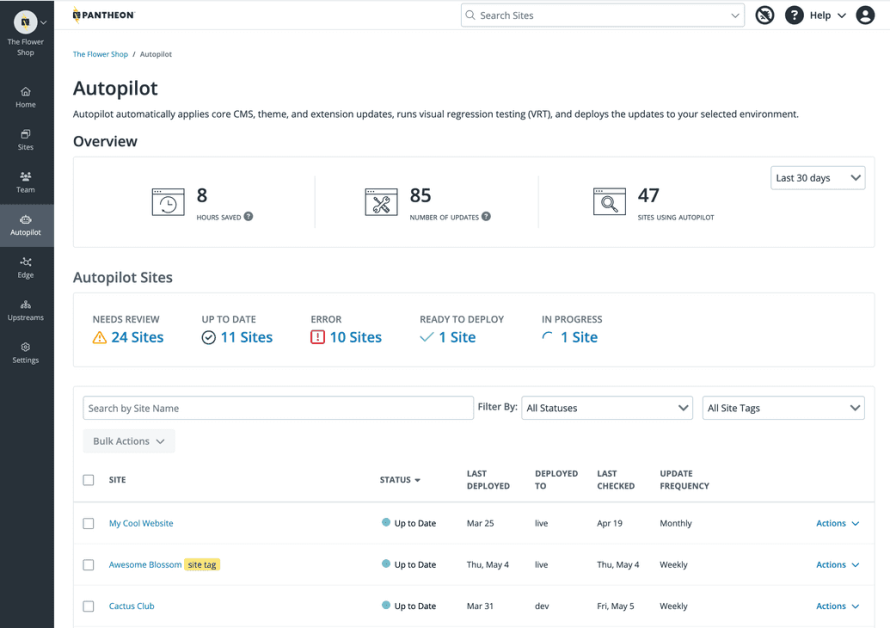
Pantheon's Autopilot is an automated update management tool for WordPress and Drupal sites hosted on Pantheon.
When Autopilot finds an update, it applies it in an isolated Multidev environment and then conducts Visual Regression Testing (VRT). This involves comparing screenshots of the live site to the version in the Multidev environment to pinpoint even the most granular changes that an update would create.
You get the chance to review these changes and decide whether or not to move on with an update, so you’re never caught off guard by changes after they’re already live. It’s also built to be a single pane of glass solution that allows site admins to manage multiple websites in one place.
Notable integrations: Pantheon, WordPress, Drupal.
Strengths:
- Unified multisite management capabilities.
- Solid visual regression testing.
- Gentle learning curve.
Weaknesses:
- Availability limited to WordPress and Drupal sites hosted on Pantheon.
Pricing: included with Pantheon's Gold plans and up.
2. Cypress
Image
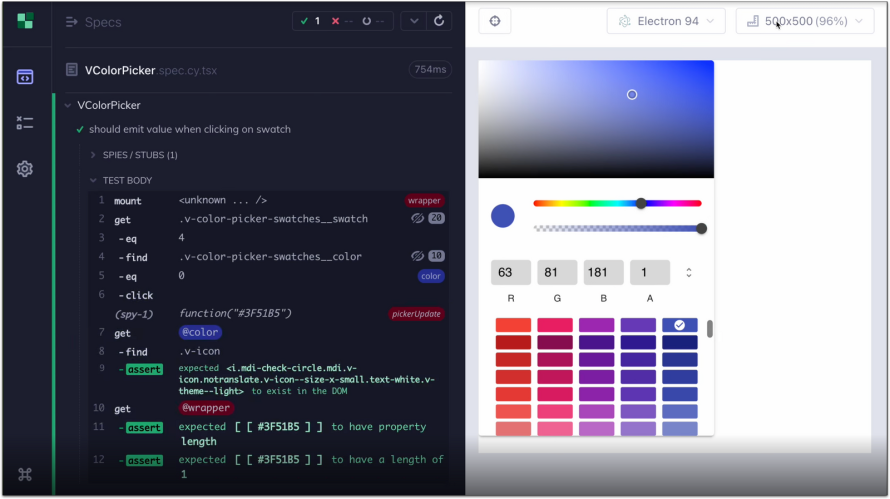
Cypress provides testing frameworks for JavaScript, meaning its focus is on web apps. It’s available as an open-source app or in the cloud.
The app version provides end-to-end testing and component testing. The component testing supports the most used front-end JavaScript frameworks: React, Svelte, Angular and Vue. It also has a “time travel” feature that lets you review the previous states of every command.
With the cloud version, you can run parallel tests, cancel runs automatically after a set number of tests fail and implement load balancing for smoother performance.
Notable integrations: AWS CodeBuild, GitLab CI, Bitbucket pipelines and CircleCI.
Strengths:
- Easy setup and configuration.
- Fast test execution.
- Rich documentation and community support.
Weaknesses:
- Limited support for browsers other than Chrome.
Pricing: 14-day free trial, plans from $67/month.
3. Katalon
Image
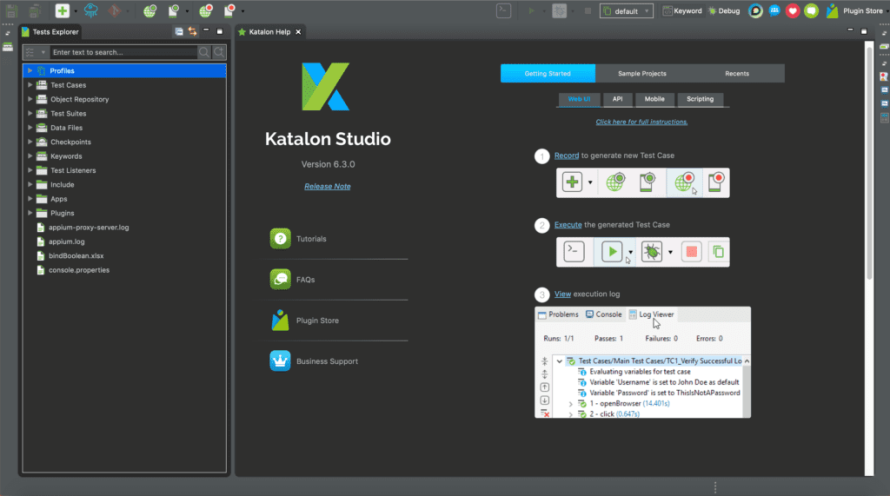
Katalon is a test automation platform that supports mobile, web, desktop and API testing. Its main product, Katalon Studio, supports low-code, no-code and full scripting for test creation.
In low-code mode, Katalon Studio turbocharges your testing with built-in keywords. These pre-packaged code snippets let you construct workflows by customizing parameters for specific actions, dramatically reducing manual coding time. It also supports data-driven testing as well as rich reporting and analytics.
Notable integrations: CircleCI, GitHub, GitLab, Azure DevOps, BitBucket, Jest and Jenkins.
Strengths:
- User-friendly interface.
- Comprehensive documentation and community support.
- Free and enterprise versions available.
Weaknesses:
- Limited advanced customization options.
- Performance issues with large test suites.
Pricing: Free tier available, premium from $175/user/month.
4. Appium
Appium is an open source tool for automated UI testing. While it was initially released with a focus on iOS, it has since expanded to be cross-platform, with support for a wider variety of platforms, including Android, browsers like Chrome and Firefox, desktop OSs like Windows and macOS, and TV OSs like Android TV and Roku.
Image
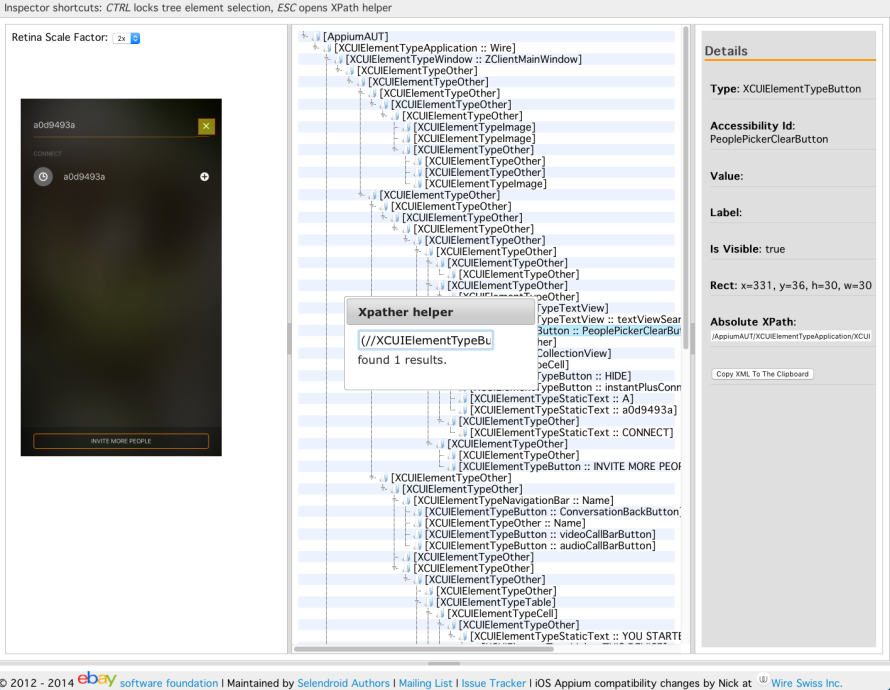
It also supports several programming languages, with the Appium team officially maintaining Java, Python, Ruby and C# clients.
Notable integrations: Selenium WebDriver, JUnit, pytest, TestNG and Cucumber.
Strengths:
- Open source and free.
- Large and active community.
- Supports real devices and emulators/simulators.
Weaknesses:
- Complex setup and configuration.
- Some performance issues with iOS testing.
Pricing: Free.
5. BackstopJS
BackstopJS is an open-source tool that automates visual regression testing on web apps.
Image
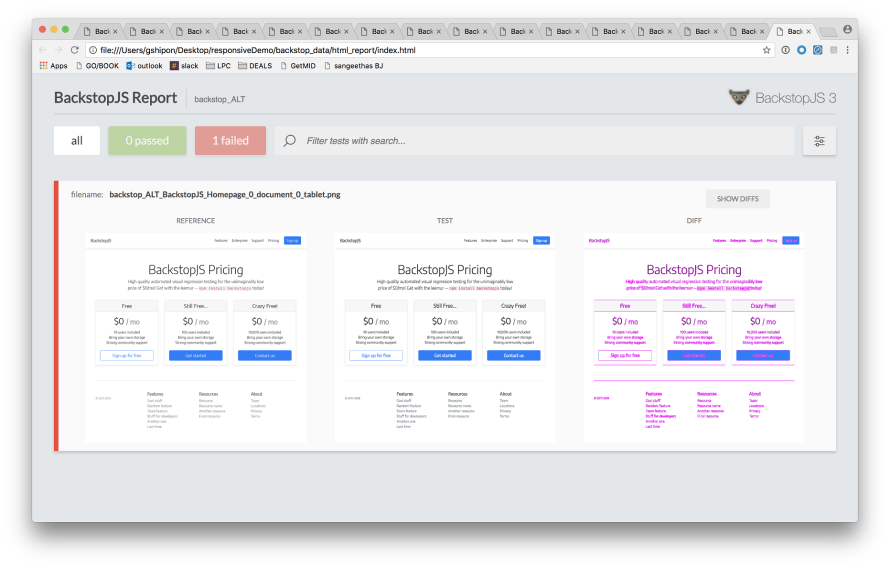
It uses Chrome Headless, a version of the popular browser but without the user interface, to run the tests. You can write scripts using Playwright and Puppeteer to simulate user interactions for the tests as needed.
Backstop is available through the Node Package Manager, so it’s compatible with a nearly universal range of web apps, including the ones hosted on Pantheon.
Notable integrations: Docker, Puppeteer, Playwright.
Strengths:
- Free and open-source.
- Wide compatibility with most web apps.
Weaknesses:
- Not beginner-friendly.
Pricing: Free.
6. TestComplete
TestComplete automates UI tests for desktop, web and mobile applications. It’s offered by SmartBear, a company that provides a collection of tools for software development, testing, management and monitoring.
Image
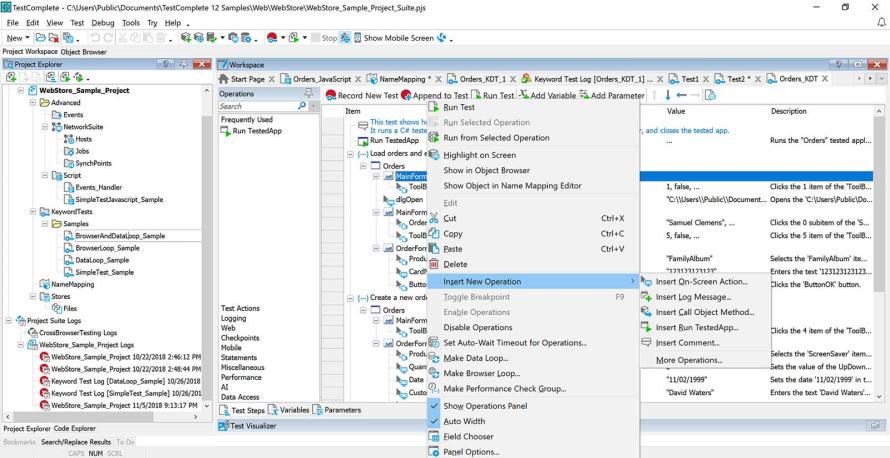
It supports scripted and scriptless tests. For scripting, you can use JavaScript, Python, VBScript and DelphiScript. In scriptless testing, you can record and replay tests to recreate scenarios.
TestComplete also provides advanced object identification by search criteria, text content and images.
Notable integrations: Jira, Jenkins and Azure DevOps.
Strengths:
- Easy to use for beginners.
- Comprehensive support and resources.
- High accuracy in object recognition.
Weaknesses:
- High licensing costs.
- Resource-intensive.
Pricing: 14-day free trial, plans from €1,724 for single-user tests on physical machines.
7. Selenium
Selenium is the most popular tool for browser-based automation and testing. It provides the following collection of open-source tools:
- Selenium WebDriver for automated control of web browsers for testing across multiple platforms and languages.
- Selenium IDE, an integrated development environment (IDE) available as a browser extension that allows for easy recording, editing and playback of test scripts without coding.
- Selenium Grid, which lets you run tests in parallel across different machines and browsers.
Image
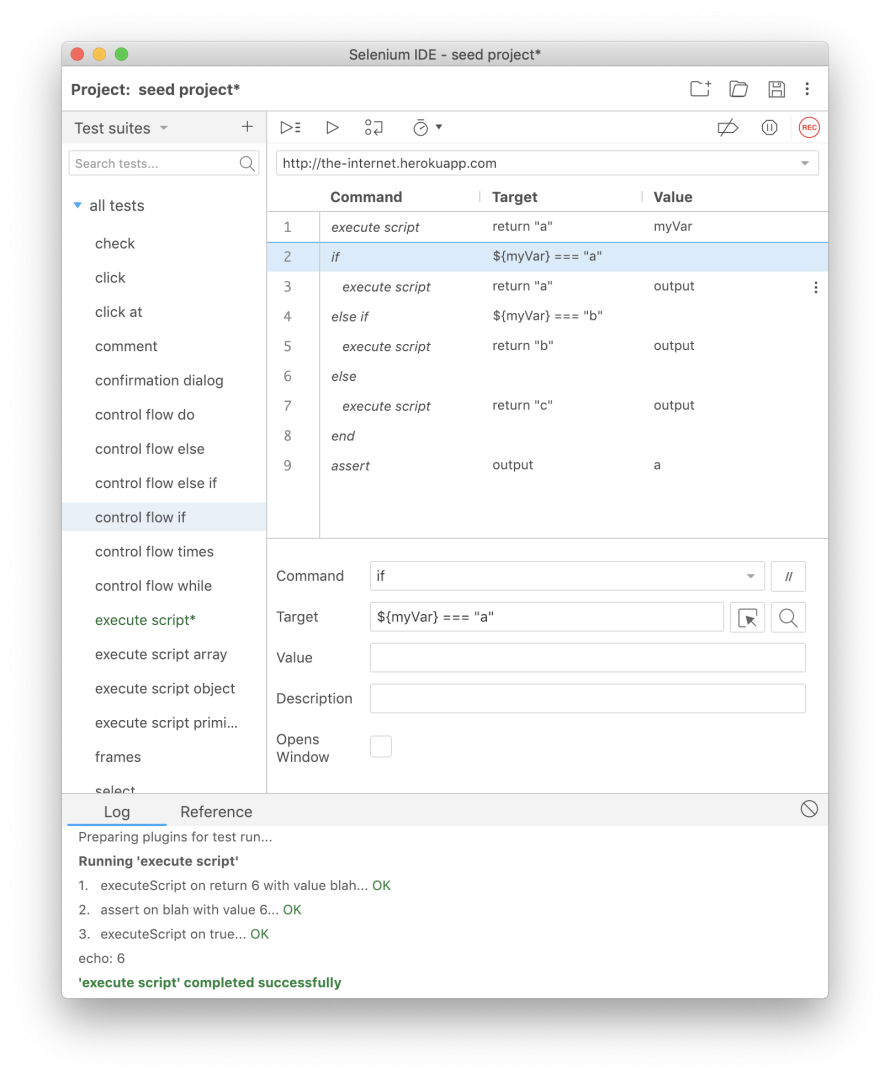
It supports all major browsers and Chrome, Edge, Firefox, Safari and Internet Explorer each unlock unique functions.
Notable integrations: JUnit, pytest, Jest and Mocha.
Strengths:
- Highly flexible and customizable.
- Large community and support.
- Free and open-source.
Weaknesses:
- Steep learning curve.
- Requires programming knowledge.
Pricing: Free.
8. LambdaTest
LambdaTest is a cloud-based cross-browser and mobile testing platform. It supports the most widely used browsers on the most popular desktop and mobile platforms, including Chrome, Firefox, Brave, Opera, Safari, Yandex and Edge.
Image
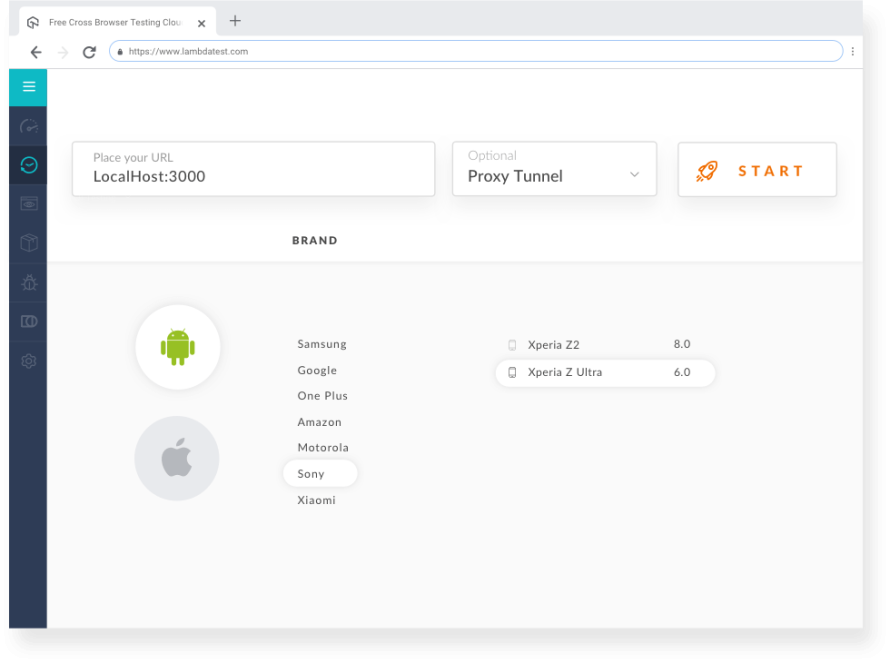
It provides real device testing with more than 5,000 iOS and Android devices, making it trivial to run tests at scale.
Notable integrations: Asana, Bitbucket, Jenkins, CircleCI, Jira, Trello and GitLab.
Strengths:
- Cloud-based, no installation required.
- Extensive browser and device coverage.
- Scalable and flexible pricing plans.
Weaknesses:
- Restrictive free tier.
- Latency issues.
Pricing: Free tier available, premium from $15/month.
9. Tricentis Tosca
Tosca is a no-code testing tool from enterprise test automation software company Tricentis. It’s highly scalable and supports end-to-end testing at an enterprise level.
Image
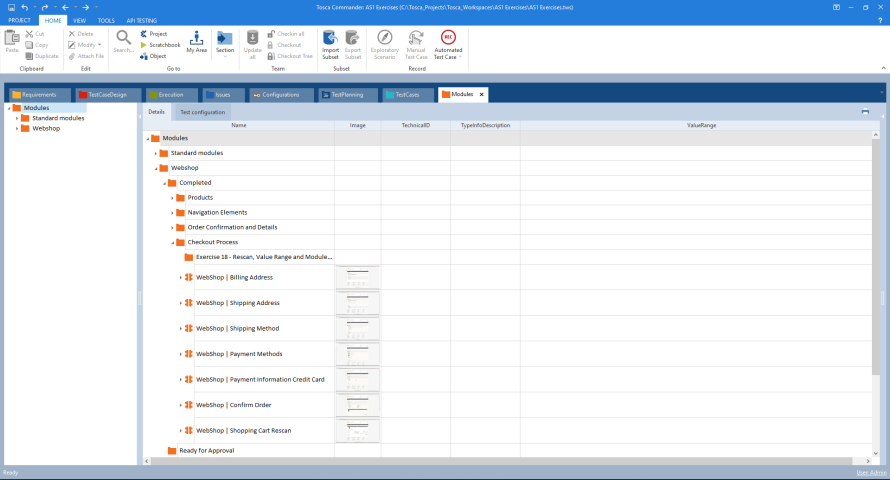
You can deploy it both locally and in the cloud, making it a flexible solution that works with your preferred infrastructure.
It’s model-based, meaning you can split the underlying application from the automation model and tweak the former without affecting the latter.
Notable integrations: Jira, Jenkins, SonarQube and GitLab.
Strengths:
- Reduces test maintenance efforts.
- Highly scalable.
- Extensive support and training resources.
Weaknesses:
- High licensing costs.
- Steep learning curve for a no-code solution.
Pricing: 14-day free trial, premium pricing available upon request.
10. Ranorex
Ranorex offers low and no-code UI test automation for web, mobile and desktop testing.
Image
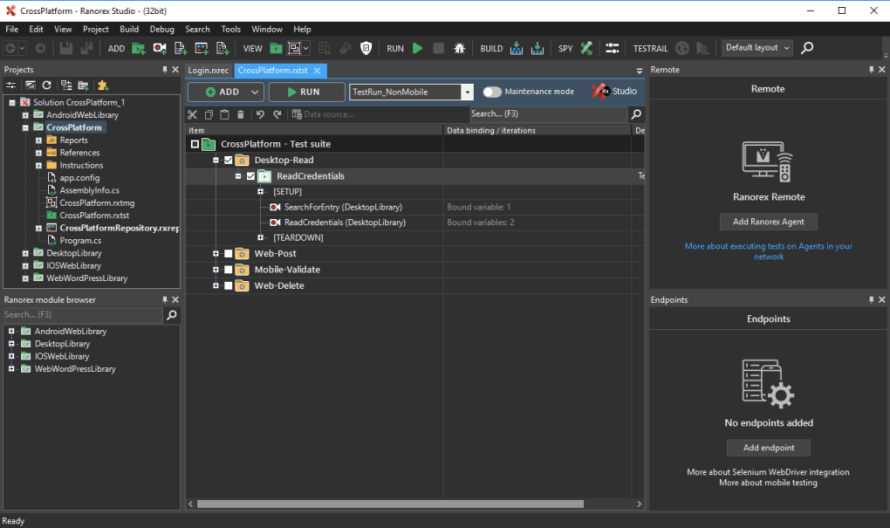
It offers most of its testing features through Ranorex Studio and focuses on data-driven testing. It enhances testing efficiency by letting you import data from external sources like SQL databases and CSV files to run identical tests with varied inputs and rapidly expand your coverage.
Notable integrations: TestRail, Jenkins and Jira.
Strengths:
- Perpetual license
- Robust object recognition and UI element identification
- Extensive support for various technologies and platforms
- Strong community and technical support
- Offers both standalone and enterprise versions
Weaknesses:
- Steep learning curve for advanced features.
- Higher cost for the enterprise version.
Pricing: Free trial available, licensing price available upon request.
11. Perfecto
Perfecto is a cloud-based end-to-end testing platform for web and mobile applications. It’s made by Perforce, a DevOps software company.
Image
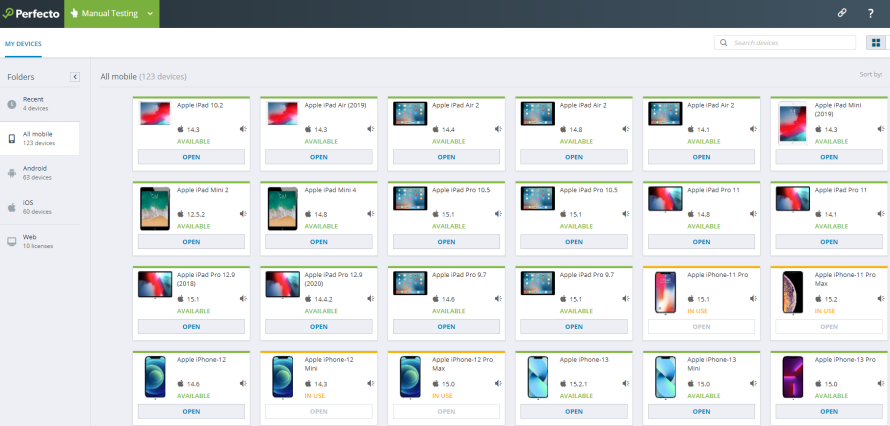
One of its main features is the Perfecto Lab, where you access cloud-based device testing. You can use real iOS and Android devices to test at scale with high accuracy. However, you can also use virtual devices with iOS simulators and Android emulators for faster and more cost-effective testing.
Notable integrations: Azure DevOps, Bamboo, Travis CI, CircleCI, Bitrise, Bitbucket and Harness.
Strengths:
- Extensive device lab with real devices.
- Highly scalable and flexible testing environment.
- Strong focus on performance and security testing.
- Excellent customer support and resources.
Weaknesses:
- Can be expensive for smaller teams or projects.
- Complex setup for initial configuration.
Pricing: Free tier available, paid from $83/month.
12. Postman
Postman is a popular API platform known for its ease of use and comprehensive set of features.
Image
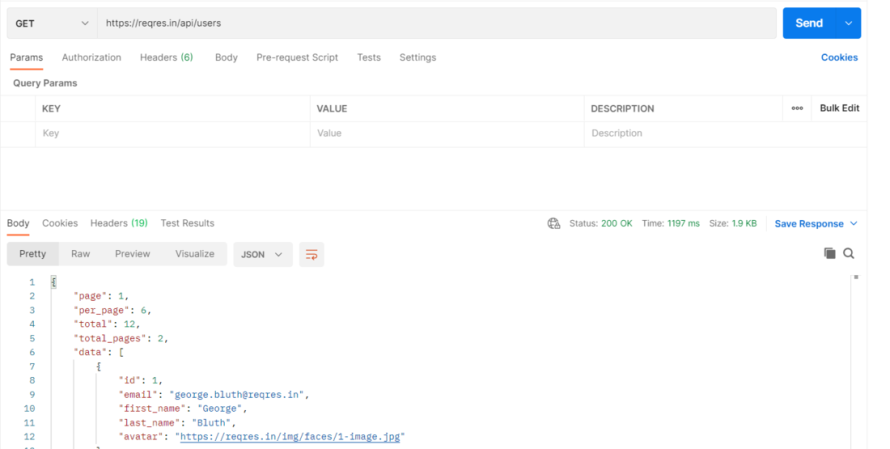
In addition to the testing features, it provides everything you need to manage an API's entire lifecycle, from design and documentation to sharing and discoverability.
Under API testing, you can perform end-to-end, unit, load and contract tests so you’re confident when pushing it out into the world. It supports collaborators so you can involve more team members in the process.
Notable integrations: CircleCI, Bitbucket, GitLab, GitHub Actions, Jenkins and Travis CI.
Strengths:
- Intuitive and user-friendly interface.
- Strong community and comprehensive documentation.
- Free and paid versions available with extensive features.
- Extensive library of pre-built requests and collections.
Weaknesses:
- Limited to API testing.
- Performance issues with very large collections.
Pricing: Free tier available, premium from $14/user/month.
Choosing Your Ideal Tool
Selecting the perfect automated testing tool depends on several factors unique to your business needs and team capabilities. Here's what to consider:
- Ease of Use: Look for tools with intuitive interfaces and minimal setup. No-code options like Ranorex offer quick starts, while code-based tools like Selenium require more initial investment.
- Technical Expertise: Match the tool to your team's skills. Selenium demands strong coding abilities, while Katalon and TestComplete provide low-code alternatives for less technical users.
- Integration Capabilities: Ensure smooth workflow by choosing tools that integrate with your existing tech stack. Most top tools offer integrations with popular CI/CD pipelines and development environments.
- Supported Technologies: Consider your project's tech requirements. Selenium supports multiple programming languages, making it versatile, while Cypress excels for JavaScript applications.
- Scalability: For large projects or growing teams, tools like Selenium and TestComplete handle extensive test suites effectively.
- Cost: Compare pricing models against your finances. Open source tools like Selenium are free but may incur indirect costs. Others offer tiered pricing or enterprise plans. Balance features against budget constraints.
- Community and Support: A strong user community can be invaluable. Selenium boasts extensive community resources, while commercial tools often provide dedicated support channels.
- Reporting and Analytics: Comprehensive reporting features, like those in TestComplete, help track test performance and identify issues quickly.
Staying Ahead With Pantheon
If you're exploring automated testing tools, you clearly take site performance seriously. Pantheon offers top-tier hosting and WebOps solutions that complement your testing efforts. We deliver lightning-fast hosting for WordPress, Drupal and NextJS sites, powered by our Advanced Global CDN. This ensures your meticulously tested sites' load quickly for users worldwide.
Collaboration is frictionless with Pantheon's Multidev feature, allowing your team to work efficiently in parallel environments. This aligns perfectly with modern development practices and automated testing workflows. Along with this, security remains a top priority for us at Pantheon, providing peace of mind as you focus on delivering high-quality experiences.
Ready to see how Pantheon can streamline your workflow and complement your automated testing efforts? Watch our demo to discover how Pantheon's powerful platform can elevate your development workflows!